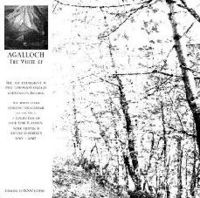AGALLOCH – The White (2008)
 Agalloch’s Ashes Against The Grain was arguably the best album of 2006. Admittedly, I teeter between that, and The Paper Chase’s Now You Are One of Us as the best of that year, but whenever it’s come up recently, I’ve been falling more on the Agalloch side of things. It’s such an expansive and harrowing work; listening to it is like seeing The Good, The Band and The Ugly for the first time. It’s huge, open, desolate. Stylistically, The White is the exact opposite. It’s very immediate and it’s not very threatening, though it does occasionally hint at darker things. And although it’s good, it’s a bit too focused on the lighter side of Agalloch’s sound for it to be admitted into the pantheon alongside The Mantle and Ashes Against The Grain.
Agalloch’s Ashes Against The Grain was arguably the best album of 2006. Admittedly, I teeter between that, and The Paper Chase’s Now You Are One of Us as the best of that year, but whenever it’s come up recently, I’ve been falling more on the Agalloch side of things. It’s such an expansive and harrowing work; listening to it is like seeing The Good, The Band and The Ugly for the first time. It’s huge, open, desolate. Stylistically, The White is the exact opposite. It’s very immediate and it’s not very threatening, though it does occasionally hint at darker things. And although it’s good, it’s a bit too focused on the lighter side of Agalloch’s sound for it to be admitted into the pantheon alongside The Mantle and Ashes Against The Grain.
Whereas Limbs kicked off Ashes Against The Grain with a hint of the heaviness that was to come, The Isle of Summer begins this album quietly, with some nature sounds and children chanting in the background. I’m not sure what it is about children’s voices that sounds so otherworldly in a context like this, but they do. Alcest used them to great affect last year with the appropriately titled Souvenirs d’un autre monde and here, they evoke the same kind misty atmosphere.
The Isle of Summer, however, is a much sparser song than Limbs, sounding more like The Wolves of Timberland (the band’s contribution to the split 7″ they did with Nest, and a fine piece of neo-folk), then it does an Agalloch song (wherein neo-folk is only a small part of the equation). The focus is on the crystal-clear acoustic guitar; there’s no menace or sorrow in the song. Even when the electric guitar briefly surfaces, it’s still a very pleasant affair. The last time we heard from Agalloch, they were burning a fortress against the sky. Now, they’re watching the sunset.
Songs like Birch Black tremble as they progress, hinting that they might take off into more troubling territory, but they just keep moving forward. It’s important to remember that darkness is as much a part of Agalloch’s music as natural imagery is, so while tracks like Birch Black aren’t bad in general terms, they fail to deliver in the way that we expect them to. The two best songs on the album work precisely because they’re darker. Of the two, the seven minute Pantheist is the best. It’s the EP’s longest song, and the dirge-like atmosphere of it recalls tracks like A Celebration For The Death of Man and The Misshapen Steed. Pantheist is dreadfully solemn, evoking images of some age-old religious sect marching calmly to a sacrificial temple in a forest. The acoustic guitar is still in the forefront here, but electric guitar lurks ever so quietly in the background, before Haughm’s ethereal vocal drones emerge like an ancient incantation (and then disappear just as quickly).
If Pantheist is the album’s best track, then Hollow Stone is a close runner-up. It’s a mostly ambient song, and it’s a nice counterpoint to the band’s last ambient track, Our Fortress Is Burning III, which closed Ashes Against The Grain with a series of dark electronic spasms. Hollow Stone isn’t dark per se, but it’s deceptively ambiguous. For every moment the music spends shimmering, there’s another moment of where the music itself seems to defy the very existence of light.
The final tracks, Sowlio Rune and Summerisle Reprise (both influenced by the 1973 film The Wicker Man ) are admirably pretty, but both songs also drift into new-age territory at points, something which is gravely opposite the aesthetic that the band have worked so hard to define (and both are marred by unnecessary samples in their most revealing moments). New-age is the antithesis of what Agalloch have crafted with the folk elements of their music, in that New-age is always familiar and always non-confrontational; that Agalloch share an admiration for natural instrumentation and a reverence (sometimes fearful, sometimes not) for the wonders of the natural world are the only two things that the two have in common.
I don’t dislike The White; it’s damn enjoyable on its own terms. But I think that more than anything, The White made me realize how unique Agalloch’s sound truly is, and how important despair and a carefully balanced sonic palette are to their music. How these things work together with the actual music is what make the band so elegant. True, The White is elegant, but not because of the band performing it.
Leave a comment